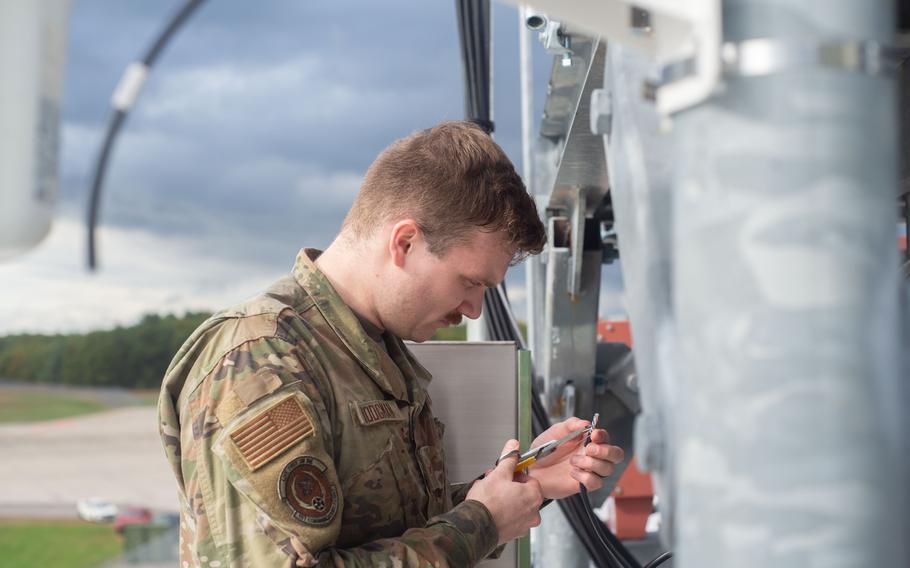
Airman 1st Class Wesley Hodgman, a cyber infrastructure airman with the 157th Communications Flight, installs a new WiFi access point on Oct. 18, 2022 at Pease Air National Guard Base, N.H. (Victoria Nelson/Air National Guard )
WASHINGTON — The Defense Department’s effort to provide troops with free high-speed Wi-Fi is focusing increasingly on remote installations where internet access is difficult to obtain, a Pentagon official said Wednesday.
Brendan Owens, the assistant secretary for defense for energy, installations and environment, said more austere locations are a “priority” for the Pentagon as it embarks on a mission to install Wi-Fi in barracks at no cost to service members.
Defense Secretary Lloyd Austin directed all service branches in September to create pilot projects for Wi-Fi as part of a broader initiative to improve the quality of life for service members and their families.
Owens said research shows service members living in unaccompanied housing primarily use Wi-Fi to keep in touch with their family and friends and take advantage of mental health services.
Troops stationed at remote and isolated locations, such as Alaska, are more likely to struggle with mental health and lack access to care, according to studies.
It took years of legal wrangling for the Defense Department to designate Wi-Fi as something that is “mission critical” but there is now momentum and a recognized need to provide the service to troops, Owens said.
For some installations, it is a simple matter of ironing out contracts with service providers and plugging in a router, he said. For more austere locations, much more physical work will likely be required.
“Whether it’s a physical transformation of the building or whether it’s some type of retrofit — all those things are things that we’re going to have to get after to be able to provide these services,” Owens said during a discussion hosted by the Center for a New American Security, a Washington think tank.
He said he could not answer whether the push for internet connectivity will extend to sailors serving on aircraft carriers and other ships who often go long periods without access to the outside world.
Internet access is routinely restricted during ship deployments to protect against cybersecurity threats and preserve bandwidth for military operations. A Navy chief was demoted earlier this year for secretly installing a private Wi-Fi network aboard a warship.
During meetings with military officials, junior troops living in barracks have repeatedly emphasized the need for Wi-Fi. The Pentagon spent more than three years gathering feedback from service members to draft a plan on how their quality of life could be improved.
“One of the questions that I ask our soldiers, our airmen, our Marines, our guardians, whoever is in those barracks is, ‘If you could have 10 more square feet in your barracks room or free Wi-Fi, what would it be?’ And no one is going to be surprised that a 19-year-old wants free Wi-Fi,” Owens said.
Military service branches have pursued their own efforts in recent years to provide Wi-Fi to their troops. The Navy in January announced a Wi-Fi pilot program for up to 4,000 sailors living at a dozen unaccompanied housing locations in Virginia.
The Pentagon is now pooling the experiences of individual services to create an overarching policy plan across the military, Owens said.
“We’ve got a lot more work to do on making sure that we are capable of providing the Wi-Fi services that are necessary to fully support what our service members need,” he said.